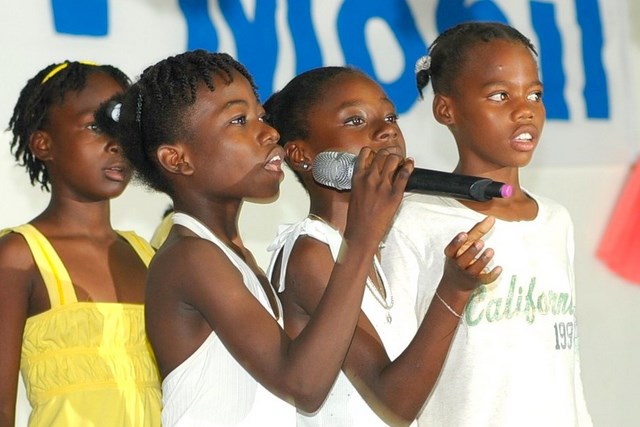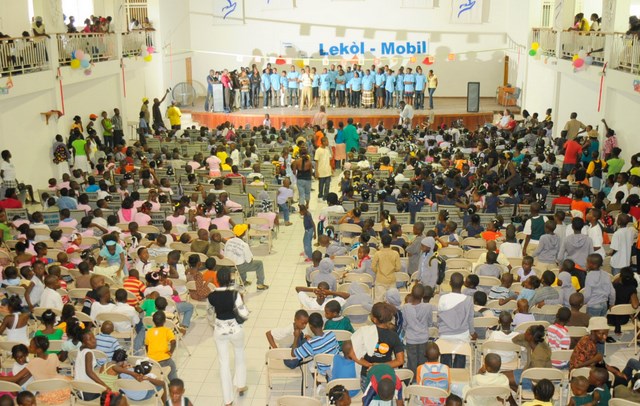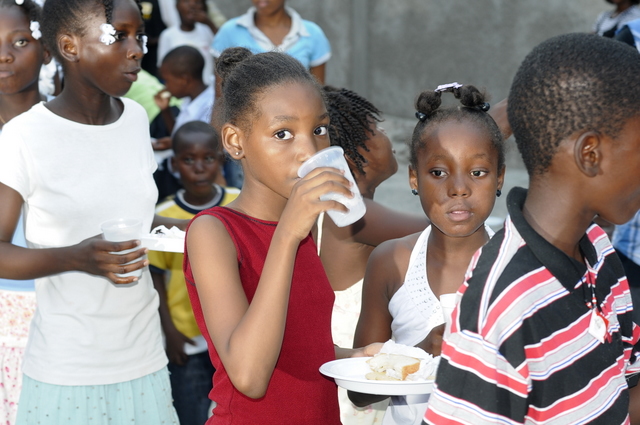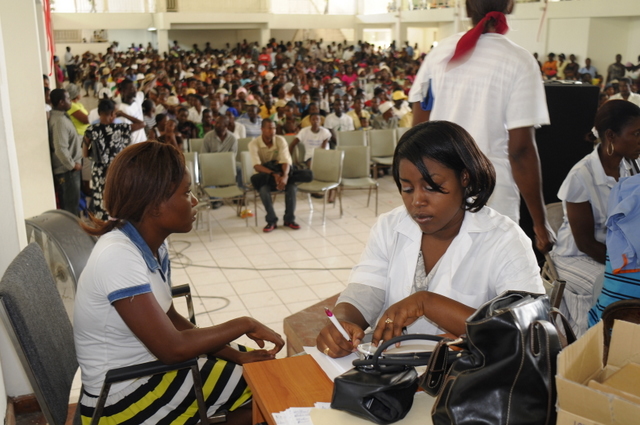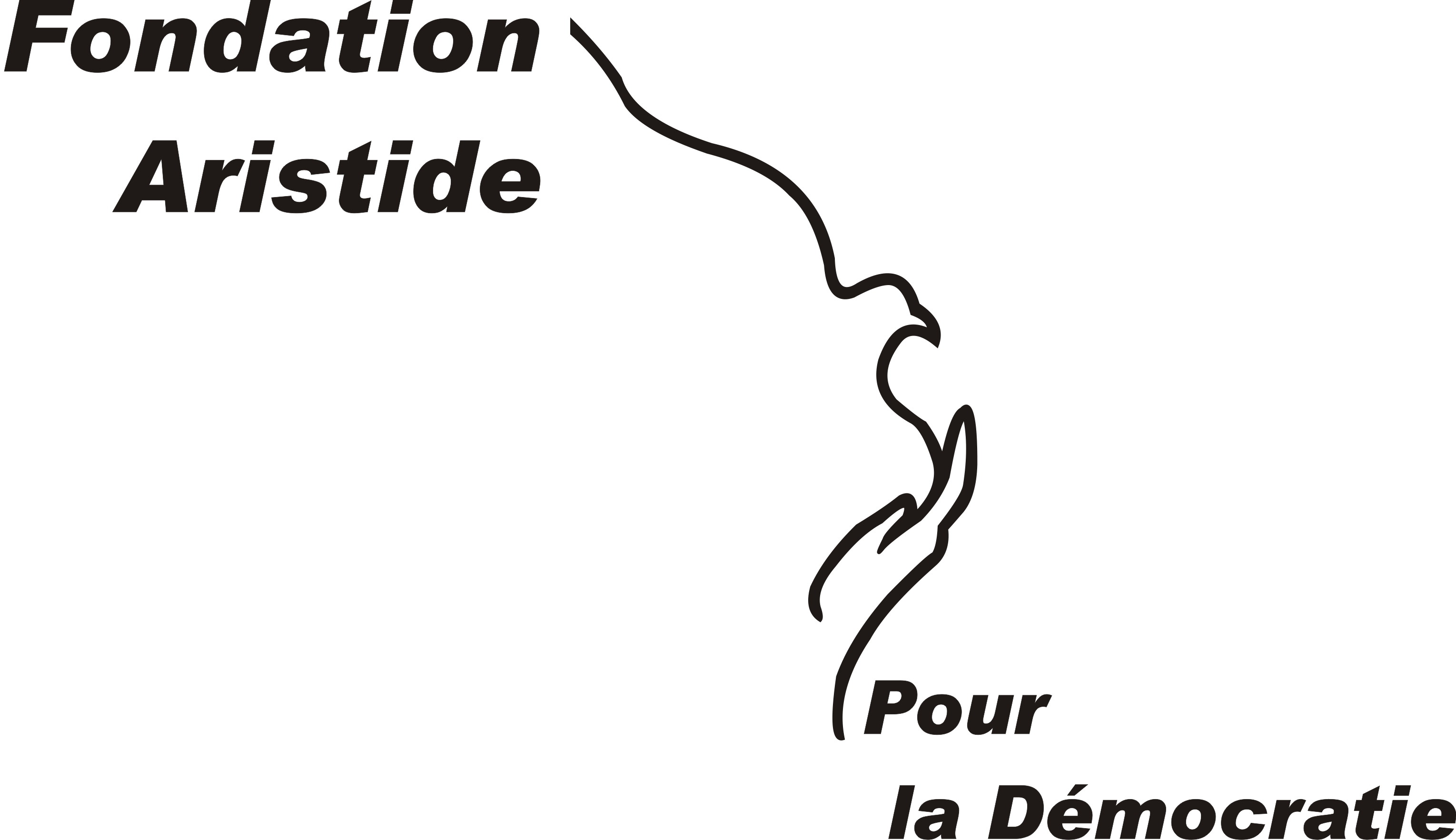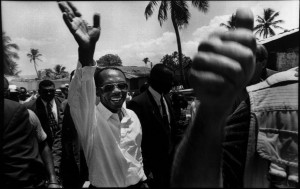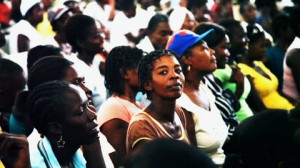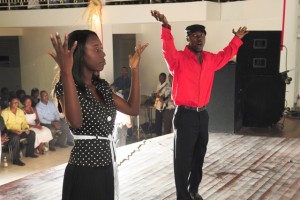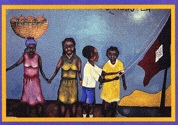A Day Away from the Mud and Heat
On Saturday April 24 thousands of children from the AFD Mobile School gathered for a cultural celebration at the Aristide Foundation. Since late February the AFD has been operating open-air classrooms serving 1260 children who lost their homes in the January 12, 2010 earthquake. The schools are in refugee camps at Fontamara, Nazon, Tarpage, Carredeux, and Building 2004.
For two weeks leading up to the event teachers and kids in the Mobile Schools prepared presentations on the theme “Life with Love.” On the afternoon of the 24th buses from the Foundation brought the children, their families, and friends to the AFD for the event — over 2000 people in all.
Marie Stuart Roche, the director of the Mobile School project welcomed all the kids to the Foundation — which she reminded them is their home.
Toussaint Hilaire, the Director of the AFD welcomed the children and their families on behalf of former President Aristide and his wife. He reaffirmed to them the Foundation’s commitment to work with them for a better life –a better life meaning: school, food, healthcare, hospitals and parks for them to play in.
Zamor, the coordinator of the schools at 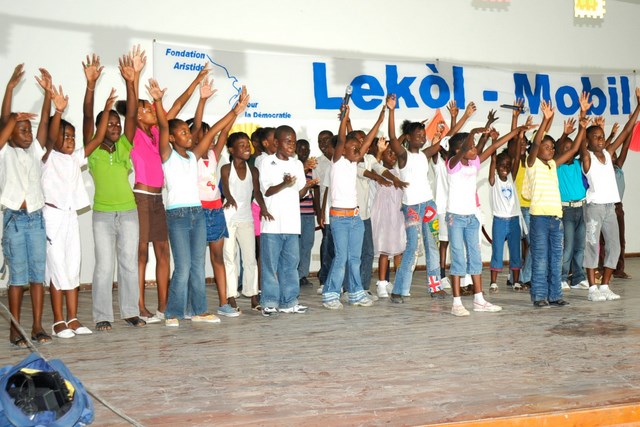 Nazon then took over as MC and introduced the kids, who put on a spectacular show. The kids from the schools at Nazon danced and sang, the schools from Fontamara put together a threatrical piece about what they lived through at the moment of the earthquake. The kids from the camps near Building 2004 danced and read poetry. The schools at Carradeux and Tarpage performed music and danced.
Nazon then took over as MC and introduced the kids, who put on a spectacular show. The kids from the schools at Nazon danced and sang, the schools from Fontamara put together a threatrical piece about what they lived through at the moment of the earthquake. The kids from the camps near Building 2004 danced and read poetry. The schools at Carradeux and Tarpage performed music and danced.
All the children who attended received new t-shirts, part of a large gift of new clothing from American Apparel. The AFD is distributing these clothes to the kids in the Mobile Schools and to others living in refugee camps around Port-au- Prince. We want to thank American Apparel for the generous donation. There are a lot of used clothes coming into Haiti as donations right now, and while people are in great need of all kinds of assistance, it is especially nice to be able to give the kids new clothes — made in the US, and sweatshop-free to boot.
After the event, everyone present, teachers, kids and their families shared a meal together. It was chance for everyone to be out of the mud and heat that is a daily part of their lives and to celebrate what the teachers and kids in the Mobile Schools have accomplished together over the past two months, under these extraordinary circumstances.
AFD Clinincs Treat Over 1,000 People Each Week
Every Wednesday morning in the auditorium of the Aristide Foundation for Democracy in Tabarre, Haiti, over a 1000 people receive free primary care treatment. Almost all of the people coming to the Foundation for care are living in temporary settlements in the area.
The clinics have become a weekly gwo konbit medical – with 40 or more doctors, dozens of volunteers and health workers and pharmacists, working together to make sure that everyone who comes sees a doctor and receives the medicine they need.
Services offered include: general medical care, as well as pediatric, eye, dental, gynecological, orthopedic and psychological care. The Haitian Ministry of Health (MSPP) sends health monitors to carry out vaccinations for all those who want them. Canned milk is distributed to all pregnant women and mothers of young children.
The most commonly observed health problems are malnutrition, diarrhea in children, respiratory ailments, urinary tract infections, intestinal parasites, and untreated high blood pressure. The vast majority of those attending the clinics are living in temporary settlements (tent cities) across the metropolitan area. Many of the health problems they face are a direct result of the conditions in the camps, which have little or no sanitation and limited water. And it is now raining nearly every night.
“We Want Our Voices To Be Heard”: Democracy in Haiti’s Earthquake Zone
By Laura Flynn
“We are living in the mud. We are wet and we are hungry. Those in charge have left us without hope. If they have a plan we do not know it. We are asking about the future. And we want our voices to be heard, ” Suzette Janvier, a resident of St. Martin (a neighborhood of central Port-au-Prince)
Each Saturday for the past two months a thousand or more Haitian earthquake survivors have met in the auditorium of the Aristide Foundation for Democracy to talk about the future of their country. Since its founding in 1996 the Aristide Foundation, whose auditorium seats up to 3000 people, has provided a place for grassroots activists and ordinary Haitians to come together to debate and discuss national issues. In response to the earthquake the Foundation is sponsoring weekly public forums in which participants tell their stories, talk about the conditions of their lives, and describe their needs; they receive training or information on the current situation and on their rights under the Haitian constitution, and the United Nations principles on Internally Displaced People; and together presenters and participants brainstorm and discuss actions that can be taken to make their voices heard. Each forum has drawn between 900-1500 participants; the majority of those attending are living in spontaneous settlements across the earthquake zone–as are the majority of the citizens of Port-au-Prince. Delegations come from other parts of the country as well, particularly the South and Southeast – Jacmel and Les Cayes –which were also hit hard by the quake.
Participants at AFD forums have offered vivid testimony about conditions of life in Port-au-Prince since the earthquake. Now that the rains have begun, people describe spending the nights “domi pandeye,” (sleeping while balancing upright), standing under their plastic sheeting because there is no room for everyone to be sheltered and lie down, and because water floods the tents. During the rainy season, which has already begun, but will intensify in May, it rains nearly every night. In the morning the sun blazes, the heat under the plastic sheeting—which is all most people have to protect themselves—is stifling. They are now living in “labouye” (the mud) 24 hours a day, in camps almost uniformly lacking in latrines, or other sanitation.
